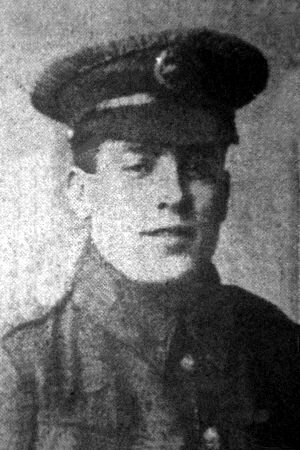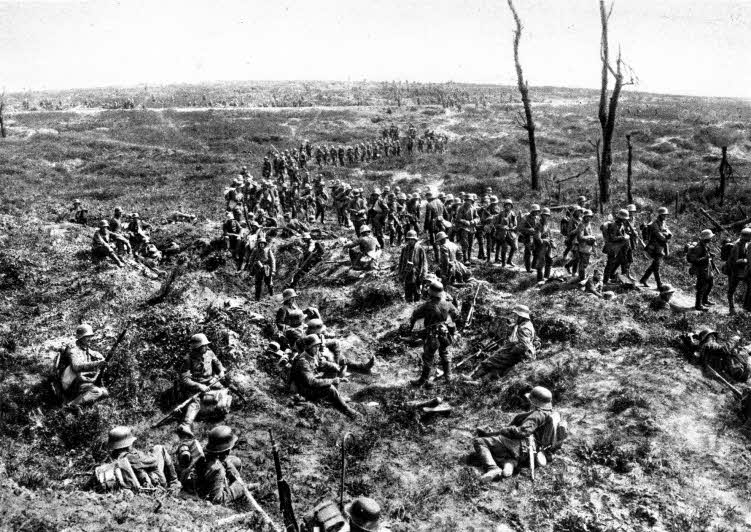
Joseph Fothergill Wilson was born on the 25th February 1892 and baptised at Ossett Holy Trinity on the 6th November 1892, the son of printer, John Gideon Wilson and his wife Martha Ann (nee Preston) of Church Street, Ossett, who had married in 1887.
In 1891, Kirkstall-born, John Gideon Wilson and Wakefield-born Martha Ann were living on Church Street, Ossett with their two sons: Francis (born 1889) and Albert (born 1890), both born in Ossett. By 1901, John Gideon Wilson, who was born in 1861 in Hunslet, Leeds has changed his name to John Gideon Wilson Fothergill. He is now working as a cloth carboniser and is still living on Church Street, Ossett. There are six children in the Wilson/Fothergill family, Sadly, John Gideon Fothergill Wilson died late in 1901, aged 40 years, whilst still living at at Ossett.
In 1911, widow Martha Ann (now) Fothergill was living at Streetside, Ossett with her children: Francis, born 1889 (who was classed as a ‘lunatic’ in the census), Albert (1890), Joseph (1892), Amy (1894), Elsie (1896), Rebecca (1898) and Gideon (1902). Martha has had seven children who all lived to 1911 and six of them were born in Ossett; Elsie was born in Horbury.
The 2nd Battalion, West Yorkshire Regiment (Prince of Wales’s Own) was in Malta in August 1914 when war broke out, they returned to England, landing at Southampton on the 25th September 1914, to join 23rd Brigade, 8th Division at Hursley Park near Winchester. After training they proceeded to France, landing at Le Havre on the 5th of November 1914, a much needed reinforcement to the BEF. The 2nd Battalion remained on the Western Front throughout the conflict, seeing action at Neuve Chapelle, Aubers Ridge and Bois Grenier during 1915, in the Battle of the Somme in 1916, in the retreat to the the Hindenburg Line and the Third Battle of Ypres in 1917, on the Somme, the Aisne, the Second Battle of Arras and the Final Advance in Artois in 1918.
Private Joseph F. Wilson was possibly wounded but definitely captured by the Germans during the Third Battle of the Aisne, which began on the 27th May 1918. At 01:00 hours on the 27 May, over 3,700 German guns opened up in the fire pattern devised by Colonel Bruchmuller, saturating Allied gun emplacements, isolating the HQs as the communication lines were broken, and disorientating the defenders. The effect of gas shells was not to kill, but to cause every possible form of nuisance to the key personnel of the British Army in carrying out their duties. Everything was made more difficult, everything was more uncomfortable, everything was more tiring and stressful. The barrage went through its phases until the German storm troopers burst out of their trenches at 03:40 hours. No-one in either the 8th Division or 50th Division Headquarters had any idea of what was happening.
All along the British front the Forward Zone had been overrun and German infantry were still pushing ever onwards. 24 Field Ambulance, 8th Division, found their dressing station was too far ‘advanced’. When fewer and fewer casualties reached them after the barrage lifted, they found they were surrounded by German storm troopers and had little choice but to surrender. The German army had had a startlingly successful first day since they had ripped a hole in the Allied lines 35 miles wide and 12 miles deep. By the 30th May the Germans had advanced 40 miles and reached the Marne.1
The “Ossett Observer” 2 had this report and obituary for Private Joseph Fothergill, who in fact was Joseph Fothergill Wilson. His father, for some reason, had dropped the surname Wilson in the 1901 census, but the army records Joseph with the surname Wilson rather than Fothergill:
“Rifleman Joseph Fothergill (26), West Yorks Regiment, son of Mrs. Fothergill, of Moorroyd-street, Street-side, Ossett is reported to have been missing from his regiment since the latter part of May. In July last he was wounded and gassed. He used to work at Old Roundwood Colliery and has a brother in France.”
“Ossett Soldier’s Death In Germany – The death is officially announced to have taken place on November 5th, while a prisoner in Germany of Rifleman Joseph Fothergill (26), West Yorkshire Regiment, son of Mrs. Gideon Fothergill, of Dewsbury-road, Ossett. Deceased had done a good deal of war service. Enlisting in July, 1915, he first went to France in February of the following year. He was wounded and later suffered from gas poisoning. Last Easter Sunday he returned to the western fighting front for the third time, and was taken prisoner in May. He used to work at Old Roundwood Collieries.”
Private Joseph F. Wilson’s medal card records West Yorkshire Regiment service numbers 4308 and 306528. He did not serve overseas before 31 December 1915 and was awarded the British and Victory medals posthumously. His service record has not survived.

Above: Well-equipped German storm troopers at the 3rd Battle of the Aisne in May 1918.
Private Joseph F. Wilson died on the 5th November 1918, aged 26 years, as a German prisoner of war, and is buried at grave reference VI. J. 18. at the Niederzwheren Cemetery 3, Hessen, Kassel, Germany. The city of Kassel lies in the centre of Germany approx 165kms south of Hannover. The cemetery was begun by the Germans in 1915 for the burial of prisoners of war who died at the local camp. During the war almost 3,000 Allied soldiers and civilians, including French, Russian and Commonwealth, were buried there.
In 1922-23 it was decided that the graves of Commonwealth servicemen who had died all over Germany should be brought together into four permanent cemeteries. Niederzwehren was one of those chosen and in the following four years, more than 1,500 graves were brought into the cemetery from 190 burial grounds in Baden, Bavaria, Hanover, Hesse and Saxony.
There are now 1,796 First World War servicemen buried or commemorated in the Commonwealth plot at Niederzwehren. This total includes special memorials to 13 casualties buried in other cemeteries in Germany whose graves could not be found.
References:
1. “Not Again”, The German Offensive on the Aisne, 27th May 1918
2. “Ossett Observer”, 29th June 1918 and 1st March 1919